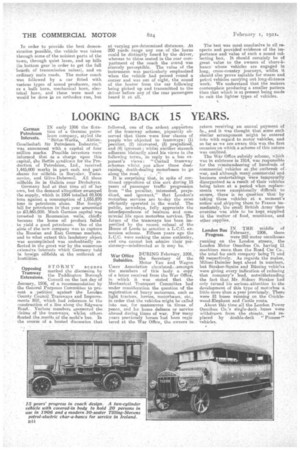LOOKING BACK 15 YEARS.
Page 26

If you've noticed an error in this article please click here to report it so we can fix it.
IN early 1906 the flotation of a German petroleum company, styled the " Sirius-Werke, AktienGesellschaft fiir PetroleUrn Industrie," was announced with a capital of four million marks. Possible investors were informed that as a charge upon this. capital, the Betlin syndicate for the ProduCtion of Petroleum, Ltd.,. received 1,445,000 mark in part cash and part shares for oilfields in Boryslav. Testanovice, and Glive:Dobromil. All these oilfields lie in Galicia near Drohohycz.
Germany had at that time oil of her own, hut the demand altogether swamped the 6upply, which in 1904 totalled 89,606 tons against a consumption of 1,033,870 tons in petroleum alone. Her foreign bill for petroleum inithat year amonnted to £3,665,000, Much German capital was invested in Roumanian wells, chiefly because the home oil product failed to yield a good petroleum. One of the .aims of the new company was to capture the Russian and East German markets, and to what extent this laudatory object was accomplished was undoubtedly reflected in the great war by the numerous extensive -interests which Germany held in foreign. oilfields at the outbreak of hostilities.
German Petroleum interests.
STORMY scenes Opposing •fluirked the discussion by Tramway
Extensions' Council on the last day of January, 1906, of a recommendation by the General Purposes Committee. to •present a :petition against the London County Council Tramways and Improvements Bill, which had reference to the
construction of a line along the Edgware Road_ Various members sponsored the 'claims of the .trainways, whilst others flouted.the merits of the mobile bus. In the course of a heated discussion that followed, one of the ardent supporters of the tramway scheme, piquantly observed that there were four classes of people who objected to tramways: (1) peculiar, (2) interested, (3) prejudiced, and (4) ignorant; whilst another staunch adherent. blatantly aired his, views in the following terms, in reply to a bus exponent's views: "Gin-tail tramway schemes whilst yon allow those dustraising, death-dealing motorbuses to go along the road. .
It is. surprising that, in spite of continued opposition of this Sort during 15 years of passenger traffic progression from " the peculiar, interested, preju
diced, and ignorant," that London's motorbus services are to-day the most efficiently,* operated in the world. The public nowadays, fully appreciate the interdependence of business arid . DarnminTial life upon motorlaus services. The future of the tramways has been imperilled by the recent refusal of the House of Lords to sanction a L.C.C. extension scheme. Fifteen years ago the L.C.C. were seeking the same authority, and one cannot but admire their persistency—misdirected as it may be.
War Office DURING February, 1906, Subsidies. the Secretary of the Motor Van and Wagon Users Association circulated ...amongst the members of this body a copy of a letter received from the War Office, in which it MIR stated that the Mechanical Transport Comniittee had -under consideration the question of the registration of heavy motorcars, such as light tractors, lorries, motorbuses, etc., in order that, the vehicles might be called into use, for manoeuvres in times of peace, and for home defence or service abroad during times of war. For many years previously horses had been registered •at the War Office, the owners in return receiving an annual payment of 5s., and it was thought that some such similar arrangement might be entered into with regard to motor vehicles, and so far a,s we are aware this was the first oceasiem on which a scheme of this nature was outlined. The War. Office subsidy scheme, which was in existence in 1914, was responsible for the .cominand.eering of hundreds of commercial vehicles at the outbreak of war, and although many commercial and business undertakings were temporarily disorganized as-a result of their vehicles being taken at. a period when replaceMerits were exceptionally difficult, to secure, there is no question' that by taking these vehicles at a moment' notice' and .shipping them to France immediately, -the small British Army then overS&ts was able to be kept supplied in the -Matter of food, munitions, and other supplies, London Bus IN THE middle of Pro ess. February, 1906, there gr
-were 282 'motor omnibuses running on the London streets, the • London Motor Omnibus. Co. having 11 machines more than the Road Car Co.. the total for each company being 71 and 60 respectively. As regards the makes, Milnes-Daimler kept ahead in numbers, but Straker-Squire and Bussing vehicles were giving :every indication of reducing that company's lead,, notwithstanding the fact that Mr. Sidney Straker had only turned his serious-attention to the development of this type of motorbus a little more than a. year previously. There were 81 buses running on the Cricklewood-Elephant and Castle route.
About this time nil the London Power Omnibus Co.'s single-deck. buses were withdrawn from the streets, and replaced by double-deck Pioneer." vehicles.




































